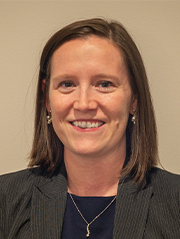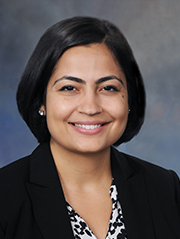2021
-

Margaret Freeberg, PhD
Virginia Commonwealth University
Proposal Title: Targeting multiple disease pathways
This proposal is funded by Boehringer Ingelheim Pharmaceuticals, Inc.
Idiopathic pulmonary fibrosis is driven by multiple overlapping disease-causing processes. Most current research focuses on treating single pathways, resulting in challenges and failure when translated from the lab to clinical trials. Freeberg will investigate a recently identified overlap of two previously presumed independent processes that promote fibrosis: tissue stiffness and energy metabolism by lung cells. “I’ve identified a probable cell receptor involved with these processes that has potential to be developed into a therapy that targets these multiple disease pathways at the same time,” she says. “The long-term goal is to identify a co-targeting treatment option that will more effectively block the progression of fibrosis compared to current single therapies.”
-

Peter Jackson, MD
Virginia Commonwealth University
Proposal Title: Targeting multiple disease pathways; Investigating postTB lung impairment
This proposal is funded by Boehringer Ingelheim Pharmaceuticals, Inc.
Up to half of acute tuberculosis (TB) survivors will develop post-TB lung impairment (PTLI). With over 90 percent of TB cases occurring in low- to middle-income countries, PTLI often results in food insecurity, worse socioeconomic status, and increased mortality from secondary causes. Building on a postulated link between the bacteria that cause TB and the patient's immune system, Jackson’s study will be the first not only to determine clinical risk factors for PTLI development, but also to evaluate over time the immunologic pathways that cause this disorder. He will analyze inflammatory cytokines (molecules secreted from immune cells that promote inflammation) and regulatory lipids (compounds that regulate certain biological processes) in the blood and lung “to identify the cause of PTLI and discover targets for therapies that can prevent this devastating disease,” Jackson says. -

Bhavika Kaul, MD
University of California San Francisco
Proposal Title: Targeting multiple disease pathways; Understanding gaps in access to care
This proposal is funded by The Chuck and Monica McQuaid Family Foundation
Kaul’s scholarship focuses on improving outcomes for patients with idiopathic pulmonary fibrosis (IPF). In her prior work, she has identified a national cohort of 139,000 U.S. veterans diagnosed with IPF between 2010-19 and found that less than 5 percent were prescribed antifibrotics. “Utilization was disproportionately low among female, Black, and rural patients with variability in practice patterns across Veterans Health Administration facilities,” she says. During her tenure as a PFF Scholar, Kaul will explore the reasons for these disparities, identify access barriers, and suggest ways to address them. “My long-term goal is to develop new care delivery strategies to bridge access gaps and improve outcomes for patients with IPF,” she says.
-

Andrea Oh, MD
National Jewish Health
Proposal Title: Targeting multiple disease pathways: Speeding the diagnosis of PFILD
This proposal is funded by Shomala Tambyraja in memory of Dr. Samuel Tambyraja
New antifibrotic drugs slow disease progression in progressive fibrosing interstitial lung disease (PF-ILD). However, PF-ILD currently requires documentation of disease progression by imaging or pulmonary function tests, which may delay treatment. “There is an urgent, unmet need to identify patients with PF-ILD as early as possible to improve long term outcomes,” Oh says. Advanced computer techniques using artificial intelligence (AI) show promise as a better method than radiologist readings to assess fibrosis on computed tomography (CT). One AI technique, called data-driven textural analysis, can automatically detect and calculate the amount of fibrosis on CT. Oh will develop “a statistical model using patient-related factors including demographics, pulmonary function tests, blood work results, and CT scan results (with both an expert radiologist's interpretation and AI-generated fibrosis scores) to try and identify those patients with PF-ILD as early as possible,” she says.
